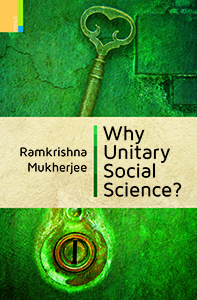
INFORMATION
- AUTHOR : Ramkrishna Mukherjee
- HB ISBN : 978-93-80607-27-6
- Year : 2012
- Extent : x + 132 pp.
- For sale only in South Asia
- Discount available on checkout
- Usually dispatched within 3 to 5 working days.
Why Unitary Social Science?
| HB ₹ 695 . $ . ₤ |
PB ₹ . $ . ₤ |
|
| POD ₹ . $ . ₤ |
e-Book ₹ . $ . ₤ |
INFORMATION
- AUTHOR – Ramkrishna Mukherjee
- ISBN – 978-93-80607-27-6
- Year – 2012
- Extent: 400 + 40 coloured illustrations
- 10% discount + free shipping
- Usually dispatched within 3 to 5 working days.
Why Unitary Social Science? pleads for a comprehensive appraisal of social reality. Tracing the visionary and transformative paths of reality from subjective to objective points of view, Mukherjee argues that it is precisely the division of social sciences into discrete disciplines that thwarts the emergence of an objective science of society. Social science is seen here as unitary, with diverse specialisations emerging from a single base but proliferating as knowledge advances, indeed as a unified social science rather than as a multitude of social science disciplines.
The Author
Ramkrishna Mukherjee received his MSc from Calcutta University and his PhD from Cambridge University, UK. He was a member of the Executive Committee of the International Sociological Association and spent his professional life with the Indian Statistical Institute (ISI), Kolkata, as a distinguished scientist. He was Professor at Humboldt University, Berlin and Binghamton University, USA. He was also associated with the London School of Economics, HMG Social Survey, UK, and the Central Statistical Office, Turkey. Associated in a steering capacity with social indicators, with quality of life research in India, and with UNESCO in Paris, Ramkrishna Mukherjee is the author of numerous books and the recipient of several national and international awards.
‘Ramkrishna Mukherjee has made a strong case, with his usual insights and clarity, for a unitary social science. This is a book to be taken very seriously by the world’s social scientists.’— IMMANUEL WALLERSTEIN, Yale University
Why Unitary Social Science? pleads for a comprehensive appraisal of social reality. Tracing the visionary and transformative paths of reality from subjective to objective points of view, Mukherjee argues that it is precisely the division of social sciences into discrete disciplines that thwarts the emergence of an objective science of society. Social science is seen here as unitary, with diverse specialisations emerging from a single base but proliferating as knowledge advances, indeed as a unified social science rather than as a multitude of social science disciplines.
The Author
Ramkrishna Mukherjee received his MSc from Calcutta University and his PhD from Cambridge University, UK. He was a member of the Executive Committee of the International Sociological Association and spent his professional life with the Indian Statistical Institute (ISI), Kolkata, as a distinguished scientist. He was Professor at Humboldt University, Berlin and Binghamton University, USA. He was also associated with the London School of Economics, HMG Social Survey, UK, and the Central Statistical Office, Turkey. Associated in a steering capacity with social indicators, with quality of life research in India, and with UNESCO in Paris, Ramkrishna Mukherjee is the author of numerous books and the recipient of several national and international awards.
‘Ramkrishna Mukherjee has made a strong case, with his usual insights and clarity, for a unitary social science. This is a book to be taken very seriously by the world’s social scientists.’— IMMANUEL WALLERSTEIN, Yale University




